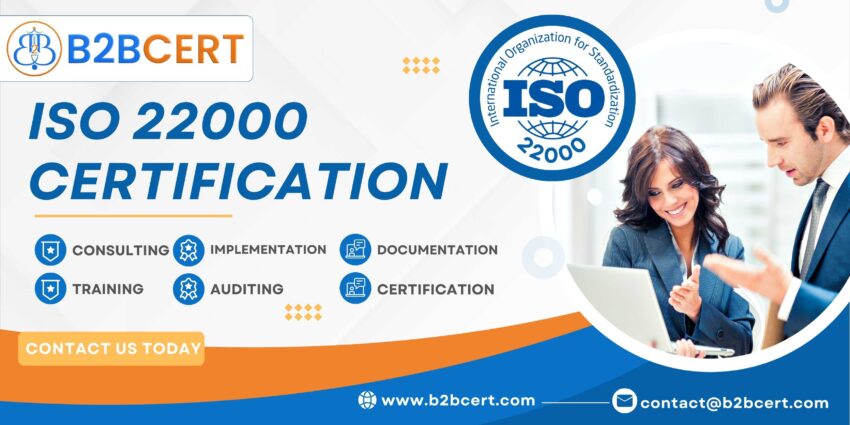In today’s global food industry, maintaining high standards of safety, hygiene, and quality is not only a regulatory requirement but also a cornerstone of consumer trust. ISO 22000 Certification in Kuwait has emerged as a key framework for organizations looking to establish a comprehensive Food Safety Management System (FSMS). This certification integrates international food safety principles, enabling businesses to identify potential hazards, implement preventive measures, and deliver safe products consistently. Across Kuwait, numerous organizations have successfully implemented ISO 22000, transforming their operations and earning greater confidence from consumers and stakeholders.
Understanding the Importance of ISO 22000
ISO 22000 in Kuwait combines the principles of Hazard Analysis and Critical Control Points (HACCP) with robust management system standards, ensuring that food safety risks are identified and controlled at every stage of the supply chain. From producers and processors to distributors and retailers, the certification applies to all food-related sectors.
Before implementation, many organizations in Kuwait faced challenges such as inconsistent hygiene practices, lack of staff awareness, and poor documentation of safety procedures. These issues often led to food contamination risks and regulatory non-compliance. However, ISO 22000 provided a systematic framework that helped these organizations establish consistency, accountability, and continuous improvement across all food safety processes.
Challenges Faced During Implementation
The journey toward ISO 22000 certification often begins with identifying internal weaknesses in food safety controls. Many organizations initially struggle with aligning their existing processes with international standards. Challenges such as inadequate employee training, limited traceability systems, and insufficient monitoring of critical control points are common.
Additionally, for some small and medium-sized enterprises (SMEs), the ISO 22000 Cost in Kuwait may appear as a financial challenge. However, with the right approach and expert guidance from ISO 22000 Consultants in Kuwait, businesses soon realize that the investment leads to significant long-term benefits, including improved efficiency, customer satisfaction, and market competitiveness.
Consultants play a vital role in simplifying the process by helping organizations design safety protocols, train staff, and implement robust documentation systems. Their expertise ensures that businesses fully comply with the ISO 22000 standard while maintaining operational efficiency.
Implementation Process and the Role of Audits
The implementation process typically begins with a detailed gap analysis to assess current practices against ISO 22000 requirements. This is followed by the establishment of a food safety policy, risk assessments, and control measures. Employee training and awareness programs are crucial during this phase, as everyone—from management to floor staff—plays a role in maintaining food safety.
The ISO 22000 Audit in Kuwait is a critical step in achieving certification. It involves an independent evaluation of the organization’s FSMS to verify compliance with international standards. Auditors review documentation, inspect facilities, and interview employees to ensure that all processes are well-implemented and consistently followed. Internal audits also help organizations identify areas for improvement before undergoing external assessments.
Positive Outcomes and Business Benefits
Organizations that have achieved ISO 22000 Certification in Kuwait have reported numerous benefits that extend beyond food safety compliance. One of the most significant outcomes is improved control over production processes, which reduces the risk of contamination and ensures consistent product quality. By adopting a structured approach to food safety, companies have enhanced operational efficiency and reduced waste.
Employee engagement and awareness have also increased substantially. Training programs and regular audits have fostered a culture of accountability, where staff understand the importance of hygiene and food safety protocols. This shift has led to fewer errors, faster problem resolution, and greater confidence in the organization’s ability to deliver safe products.
From a business perspective, ISO 22000 certification has strengthened consumer trust and brand reputation. Customers are more likely to choose products from certified organizations, knowing that they adhere to the highest international food safety standards. Additionally, certification opens doors to new markets and partnerships, as many international clients and distributors require compliance with ISO 22000 standards.
Continuous Improvement and Sustainability
A key principle of ISO 22000 is continuous improvement. Certified organizations in Kuwait regularly review their performance, monitor critical control points, and update their systems to address emerging food safety challenges. This proactive approach not only helps maintain compliance but also drives innovation in processes, packaging, and product quality.
By maintaining ISO 22000 in Kuwait, organizations contribute to the broader goal of public health protection and sustainability. Efficient resource management, reduced food waste, and compliance with environmental regulations all contribute to a more responsible and sustainable food industry.
Conclusion
The success stories of organizations implementing ISO 22000 Certification in Kuwait highlight the transformative power of structured food safety management. Through effective risk control, employee involvement, and continuous improvement, businesses have strengthened their operations and enhanced consumer confidence.
With expert support from ISO 22000 Consultants in Kuwait, organizations can navigate the certification journey smoothly, from gap analysis to the ISO 22000 Audit in Kuwait. Although the ISO 22000 Cost in Kuwait may vary depending on organizational size and scope, the long-term benefits—ranging from compliance and efficiency to customer trust and market expansion—far outweigh the investment.
Ultimately, achieving ISO 22000 in Kuwait is not just about certification; it’s about building a safer, more sustainable, and trustworthy food industry that delivers consistent quality and ensures the well-being of consumers.

